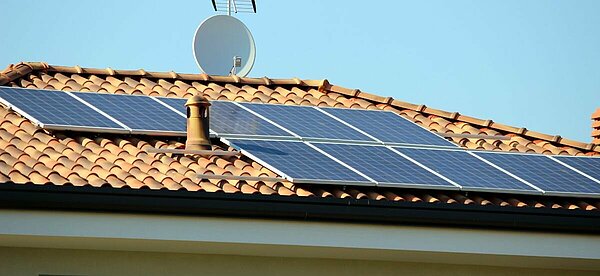
After EnergyPROSPECTS project team mapped 596 cases of energy citizenship in Europe, it's important to look at the cases in-depth, analyzing as many dimensions of energy citizenship as possible. We offer you to get to know some of the types of energy citizenship in Latvia.
Installation of solar heat panels in multi-apartment buildings, complementary with energy efficiency improvement of the building
One form of energy citizenship can be to seek solutions to save energy or make it greener through public subsidies. Energy efficiency improvement of an apartment building can be complemented by installation of local RES technologies. Decision to do it has to be made by the association or community of apartment owners of particular apartment building. The complex financial instrument (the grant, loan by ALTUM and guarantee for loan issued by commercial institution) is provided by the Latvia state-owned development finance institution ALTUM (ERDF co-financing).
One of such case is presented and shows :
- Prosumerism in district heating network.
- that apartment owners are able to establish the co-operation for the common energy due to energy savings, and
- few communities of apartment owners have been able to go further than a “classical traditional” energy efficiency improvement of building.
Off-grif: Renewable energy DIY for rural development
Alternative technologies play a vital role in supporting the transition to green energy.For this case, target group of the case is individual rural homesteads and small farmers.The objective of the project has been to collect and further explore appropriate renewable energy technology solutions and develop physical prototypes and an open license manual to promote decentralized renewable energy generation opportunities.
The case manifests itself as “A platform & community for smart solutions&ways to live with energy, a space where we share research, knowledge & experiences to deepen our common understanding. We do it for all of us and for nature.
The case as the project has been initiated and implemented by the local action (LEADER) groups - a non profit-making compositions made up of public and private organisations from rural villages having a broad representation, the activities performed have shown that there is good interest for such self-made technologies (whatsap group in Latvia involve 241 participant).
The case has provided relevant activities for the need of this target group to close the gap of competences and skills – technologies installation and demonstration in selected rural farms, practical workshops, range of handbooks for self-making RES technologies, video advising in YouTube, etc.
Edgars FRESH
Promoting environmentally friendly behavior, also in the context of energy and mobility, is another form of energy citizenship.
Edgars Fresh is a well-known influencer in Latvia, especially for young people, in his social platform he actively communicates on issues related to the environment and climate change, in addition to social networks, he is a civic participant in public consultations to follow the processes and try to influence the processes, an enthusiast and promoter of a climate-friendly lifestyle since school, and his thoughts on environmental sustainability he actively communicates on social media for wide audience, he is also involved in various actions related to climate change, acts as a moderator in climate crisis discussions, edits videos to promote the march, draws posters. His YouTube channel, Edgar Fresh, is a unique blend of environmental activism, an eco-friendly lifestyle, internet marketing, and a little entertainment.
Association “city for people”
When studying the forms of energy citizenship, we also encounter the category of NGOs as a form of energy citizenship.
Sucha case is the association "City for People" established in January 2016 with the aim of promoting the introduction of a good urban environment in Riga and other cities of Latvia. The goals of the association are: a people-oriented, high-quality public outdoor space where everyone would be safe and pleasant to stay; convenient and safe mobility opportunities in the city and beyond for everyone, regardless of age and health status; environmental protection, promotion of population health.
Such efforts are important since sustainable mobility has direct role in energy transition and reduction of CO2. Transitions towards low-carbon energy systems is part of ENCI , since conventional planning mobility approach has been changing toward sustainable smart mobility to guarantee the participation of all social groups and reduce the effects associated with transport such as energy consumption, CO2 release, air quality, wasted space in the streets or impact on public health.
The team and supporters include specialists in various fields - programmers, architects, communication specialists, marketing specialists, and urban environment specialists.